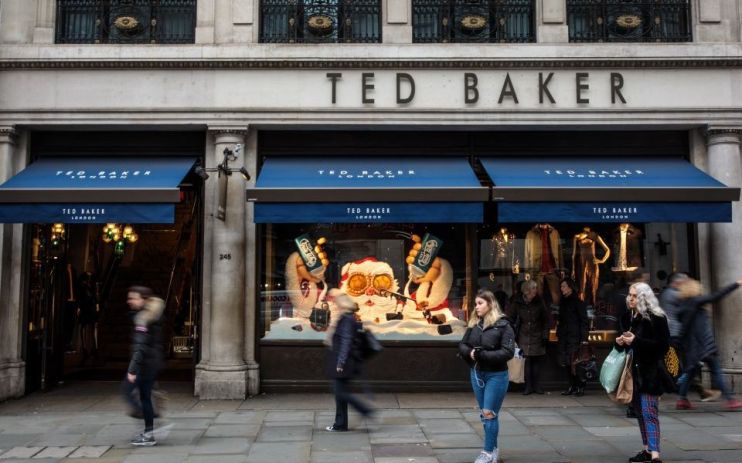Ted Baker needs a dose of urgent first aid

Oh, the irony. David Bernstein was in Switzerland in his capacity as chairman of the British Red Cross when he took a phone call ousting him as chairman of Ted Baker on Monday evening.
Forget the Red Cross: it’s the fashion retailer which requires emergency aid. In the nine months since founder Ray Kelvin quit as chief executive amid allegations — denied by him — about his behaviour towards employees, the company has issued three profit warnings, bungled its accounting of stock and seen its shares tank by over 80 per cent.
Bernstein’s elevation to the role of executive chairman in March came with a £117,000 bump to his pay package. Yet asked by a group of investors just before his exit to justify his fees, he acknowledged that he worked only two or three days a week.
Challenged about how many times he had visited Ted Baker’s operations in the US and Asia, he told them: “I don’t travel,” according to one insider.
If that’s hands-on management, it’s hardly surprising that the company is in a mess.
Lindsay Page could not survive as chief executive once the inventory problem became clear, given his long tenure as finance director.
And with Rachel Osborne, only recently recruited as finance chief from Debenhams, stepping up temporarily to replace Page, it leaves Ted Baker staring over the precipice into a retail maelstrom with a makeshift leadership team.
That’s compounded by other boardroom failings. Ronald Stewart, the senior independent director, has been a director for over 10 years, exceeding corporate governance guidelines; and Sharon Baylay, who led Bernstein’s defenestration and was immediately installed as acting chair, is likely to face stiff scrutiny if she puts her hand up for the role on a permanent basis, according to insiders.
Even after this week’s share price falls, it remains an open question as to whether Ted Baker is cheap. Christmas trading figures out next month will provide a clearer picture of the brand’s prospects.
That may well spur Kelvin’s desire to return in some capacity. After all, with 35 per cent of the shares, he has more skin in the game than anyone.
Blue-chip shareholders such as Columbia Threadneedle, Schroders and T Rowe Price might well support some form of comeback.
After an epic episode of corporate mismanagement, Ted Baker’s corporate first aid cannot come soon enough.
Unblocking Centrica
It’s a familiar feeling to most of us: find a blockage in the plumbing of our home, call an expert and then wait ages before realising we could have solved the problem ourselves.
Running Centrica, the owner of drainage specialist Dyno-Rod, must feel bit like that. The UK’s biggest gas and electricity supplier has certainly been waiting ages for a new boss.
Iain Conn, the chief executive, said in July that he would step down next year, meaning an appointment should by now be relatively imminent. His tenure was not a happy one, with the shares down sharply and key questions about its future unresolved.
In the meantime, Conn continues to try to find buyers for parts of Centrica’s mismatched asset portfolio, such as Spirit Energy, its UK oil an gas exploration and production venture. The timing of that auction is inopportune, to say the least.
I also understand that Conn has been toying with the idea of selling Dyno-Rod, which Centrica bought 15 years ago.
A Big Four accountancy firm was appointed to handle the process, with information sent to prospective buyers, sources said. However, the process has already been pulled for undisclosed reasons, they added.
Centrica declined to comment, although the decision to abandon it is unlikely to have been related to Boris Johnson’s reference on the campaign trail to “the Dyno-Rod General Election”, the objective of which was to end the Brexit logjam.
That may have given the brand another 15 minutes of fame, but Centrica’s investors are more preoccupied with unblocking the company’s urgent leadership question.
Fine art choice
What links Charles Saatchi, Picasso’s The Rescue and Andy Link, a porn star-turned-artist?
They’re all embroiled in legal battles relating to the ownership of art or art storage facilities.
This year’s $3.7bn (£2.8bn) takeover of Sotheby’s by the French billionaire Patrick Drahi has again highlighted investor appetite for the sector: the global art market was worth $67.4bn in 2018 — up six per cent on the previous 12 months.
I now hear that a well-known City figure has taken a role in the industry. Patric Johnson, former chief executive of Panmure Gordon and N+1 Singer, has popped up as managing partner of Beaumont Nathan Art Advisory, which counts ultra-high net worth individuals and family offices among its clients.
Johnson’s timing is intriguing. The advent of new anti-money laundering regulations next month will intensify scrutiny of a market that is both a vast store of wealth, yet historically opaque, unregulated and fiercely protected by insiders.
Mark Kleinman is City Editor at Sky News @MarkKleinmanSky
